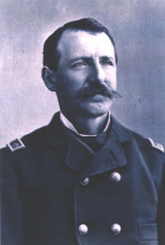
Back ألبرت جينينغز فاونتن Arabic البيرت چينينجس فونتاين ARZ آلبرت جنینقز فونتاین AZB Albert Jennings Fountain German
Albert Jennings Fountain | |
|---|---|
 | |
| Lieutenant Governor of Texas | |
| Ex officio 1871–1873 | |
| Governor | Edmund J. Davis |
| Preceded by | David Webster Flanagan (Ex officio) |
| Succeeded by | Edward B. Pickett (Ex officio) |
| President pro tempore of the Texas Senate | |
| In office March 30, 1871 – May 31, 1871 | |
| Preceded by | David Webster Flanagan |
| Succeeded by | David Webster Flanagan |
| Member of the Texas Senate from the 30th district | |
| In office February 8, 1870 – January 13, 1874 | |
| Preceded by | William B. Knox |
| Succeeded by | William H. Russell |
| Personal details | |
| Born | October 23, 1838 Staten Island, New York, U.S. |
| Disappeared | February 1, 1896 (aged 57) Las Cruces, New Mexico, U.S. |
| Political party | Republican |
| Spouse | Mariana Perez |
| Children | 6 |
| Profession | Journalist, politician, attorney, prosecutor |
| Military service | |
| Branch/service | Union Army (California Column) 1st Regiment New Mexico Volunteer Cavalry |
| Years of service | 1861–1864 1864–1865 |
| Rank | Second Lieutenant (Union) Brevet Captain (Volunteers) |
| Battles/wars | American Civil War American Indian Wars |
Colonel Albert Jennings Fountain (October 23, 1838 – disappeared February 1, 1896) was an American attorney who served in the Texas Senate and the New Mexico House of Representatives. Following a purge of corruption among cattle rustlers that Fountain investigated and prosecuted, he and his eight-year-old son Henry disappeared near White Sands, New Mexico Territory. Their bloodstained wagon and other evidence of an ambush were recovered, but the bodies were never found. Suspicion centered on two rival landowners, Oliver M. Lee and Albert Bacon Fall. Lee and two employees were tried for the murder of Henry Fountain, but acquitted after a defense by Fall. No charges were ever filed for the death of Albert Fountain.